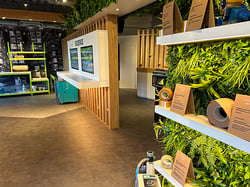
As discussions around climate change have increased in prominence in recent years, the need for greater environmental responsibility has grown, urging businesses and individuals alike to seek more sustainable practices. The packaging industry, in particular, has been under scrutiny due to its significant impact on the environment. As environmental concerns continue to escalate, businesses across the globe are acknowledging the need to adopt sustainable practices.
To increase transparency around the topic of sustainable packaging, we will highlight the key factors that make more eco-conscious packaging initiatives essential for both business success and environmental effectiveness in the long term.
Understanding Sustainable Packaging
Sustainable packaging is more than just a checkbox on the corporate social responsibility list. It's a vehicle for positive change. By opting for eco-friendly materials, businesses can significantly reduce their environmental footprint.
Sustainable packaging involves the use of materials and design practices that minimise environmental impact throughout the packaging lifecycle. The aim is to reduce waste, conserve resources, and promote recycling. As we become more aware of the consequences of single-use plastics and excessive packaging, the demand for sustainable alternatives is rising.
Need eco-packaging inspiration? Discover our latest sustainable solutions, browse our vegan-friendly product range or learn more about our green innovations and process efficiency-driven products by downloading our Sustainable Packaging Guide.
Environmental Benefits
Reducing Your Carbon Footprint
One of the most significant advantages of sustainable packaging is its potential to reduce carbon emissions. By utilising eco-friendly materials and optimising packaging designs, businesses can lower their carbon footprint and contribute to global efforts in combating climate change. This can be actioned through easier waste management processes, increased packaging efficiency and durability, and by introducing scalable reuse schemes both commercially and for consumers.
Aiding Biodiversity Conservation
Greener packaging solutions are yielding significant environmental impacts by reducing the threat of plastic pollution to wildlife. Plastic waste often finds its way into oceans, rivers, and forests, endangering marine animals, birds, and a myriad of other creatures. By choosing biodegradable and compostable packaging, businesses can prevent these materials from persisting in the environment and harming wildlife.
Moreover, sustainable packaging materials often have a lower carbon footprint compared to their conventional plastic counterparts. Reducing greenhouse gas emissions helps combat climate change, which is a significant driver of biodiversity loss. By minimising their impact on the climate, businesses indirectly support biodiversity conservation and protect vulnerable species and ecosystems.
Promoting Recycling
Sustainable packaging materials are often recyclable, encouraging consumers to participate in recycling programs. This circular approach ensures that packaging materials can be reused, reducing the burden on landfills and natural resources. While many plastics are fully recyclable, continued use of virgin plastic extends supply chains’ reliance on environmentally harmful production practices. This creates the need for greener alternatives like recycled cardboard and paper, bio degradable packing peanuts and organic fabrics.
Discover our rundown of high-performance solutions for an effective transition by reading our blog: Is Your Organisation Ready for a Sustainable Transformation?
The Power of Responsible Choices
The adoption of sustainable packaging solutions is not just an ethical choice; it's also a smart business decision. As consumers become more environmentally conscious, they actively seek out brands that align with their values. Companies that embrace sustainable practices and transparently communicate their efforts are likely to attract a growing base of environmentally-aware customers.
Moreover, embracing sustainable packaging can lead to cost savings in the long run. By reducing material waste and optimising packaging designs, businesses can lower production and transportation costs while minimising their carbon footprint. Sustainable practices often go hand in hand with increased efficiency, making it a win-win for both the bottom line and the environment.
Collaboration for a Greener Future
Embracing sustainable packaging goes beyond individual efforts; it requires collective action. Collaboration between businesses, governments, and consumers is vital to drive systemic change. Governments can incentivise sustainable practices through policies and regulations, while consumers can make a difference by supporting eco-friendly brands and demanding responsible packaging choices.
At the same time, businesses can play a leading role in driving the transition towards sustainability. By collaborating with suppliers and partners to source sustainable materials and invest in innovative packaging technologies, companies can set new industry standards and inspire others to follow suit.
The Next Steps to Driving Greener Business Practices
Sustainable packaging presents a significant opportunity to shape a better tomorrow. By choosing eco-friendly materials, optimising designs, and fostering responsible consumption, businesses can drive positive change and contribute to a more sustainable future.
To embark on this transformative journey, businesses can start by evaluating their packaging practices and identifying areas for improvement. Embracing sustainable packaging isn't just an option—it's a responsibility we all share in building a greener, more resilient world.
To explore further details on how we can assist you in elevating your packaging sustainability and diminishing your environmental impact, we encourage you to reach out to us today. You can easily get in touch by sending us a message or emailing us at sales@allpack.uk.com. We’re on hand to guide you on your path towards a more sustainable future.




